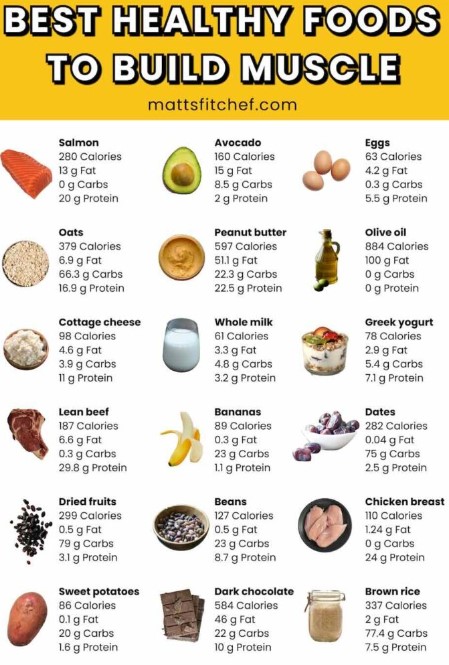BOURSESSENEGAL – When it comes to nutrition, many people focus on low-calorie diets. However, there are times when consuming high calorie foods can be beneficial, especially for those looking to gain weight, athletes, or individuals with high energy needs. In this article, we’ll explore the reasons to include high-calorie foods in your diet, their benefits, and some delicious options to consider. Understanding the right approach to calorie intake is essential for your overall health and wellness.
Why Consider High Calorie Foods?
Energy Needs and Weight Gain
People have different energy requirements based on their activity levels, metabolism, and health goals. For those looking to gain weight, incorporating high calorie foods into your meals can help you achieve that goal more effectively. These foods provide the necessary energy without needing to consume large volumes of food.
Nutrient Density Matters
Not all calories are created equal. High-calorie foods often contain a wealth of nutrients, including vitamins, minerals, and healthy fats. By choosing nutrient-dense options, you can ensure that you’re not just adding calories but also boosting your overall health.
Common Misconceptions About High Calorie Foods
High Calorie Equals Unhealthy
Many people assume that all high-calorie foods are unhealthy. However, this isn’t always the case. While junk food and sugary snacks are high in calories, many nutritious options also fall into this category. Understanding the difference is crucial for making informed dietary choices.
Fats Are Bad
Another common misconception is that fats are harmful. Healthy fats found in nuts, seeds, and avocados can provide essential fatty acids and are vital for brain health. Instead of avoiding fats entirely, focus on incorporating healthy sources into your diet.
Top High Calorie Foods to Consider
Nut Butters
Nut butters, like almond and peanut butter, are fantastic high-calorie foods. A two-tablespoon serving can contain around 200 calories, depending on the type. They are rich in healthy fats, protein, and various vitamins. Spread them on whole-grain toast, add them to smoothies, or enjoy them with fruits for a delicious and nutritious snack.
Avocados
Avocados are another excellent option. One medium avocado contains about 250 calories and is packed with monounsaturated fats, fiber, and numerous vitamins. You can slice them into salads, blend them into smoothies, or spread them on toast for a creamy texture.
Dried Fruits
Dried fruits, such as apricots, dates, and raisins, offer concentrated calories and nutrients. They provide quick energy and are rich in antioxidants. A quarter-cup of raisins can contain around 110 calories, making them an easy addition to your diet. Snack on them alone, mix them into trail mixes, or add them to oatmeal.
Whole Grains
Whole grains like quinoa, brown rice, and oats are not only high in calories but also offer a range of nutrients. For instance, one cup of cooked quinoa has about 220 calories and provides protein, fiber, and various vitamins. Incorporating whole grains into your meals can enhance both flavor and nutritional value.
Cheese
Cheese is a calorie-dense food that can be both satisfying and nutritious. A one-ounce serving of cheddar cheese contains about 110 calories and is rich in calcium and protein. Use cheese in salads, sandwiches, or as a topping for various dishes to increase calorie intake.
Dark Chocolate
For a treat, consider dark chocolate. Rich in antioxidants, a one-ounce serving of dark chocolate can contain around 170 calories. Choose varieties with a cocoa content of 70% or higher for the best health benefits. Enjoy it as a dessert or a snack to satisfy your sweet tooth.
Strategies for Including High Calorie Foods
Meal Planning
To incorporate high-calorie foods effectively, plan your meals in advance. Create balanced meals that include a source of healthy fats, protein, and carbohydrates. This approach will help you meet your calorie goals without feeling overly full.
Snack Smart
Incorporate high-calorie snacks into your daily routine. Instead of reaching for low-calorie options, choose snacks like trail mix, nut butter with fruit, or cheese with whole-grain crackers. These choices will keep your energy levels up and contribute to your overall calorie intake.
Be Mindful of Portions
While it’s important to add high-calorie foods to your diet, be mindful of portion sizes. Even healthy foods can contribute to excessive calorie intake if consumed in large amounts. Aim for moderation and balance in your meals and snacks.
When High Calorie Foods Are Beneficial
For Athletes and Active Individuals
Athletes and individuals with high activity levels often require additional calories to fuel their workouts and recover afterward. Including high calorie foods in your diet can help meet those energy needs. Focus on nutrient-dense options to ensure optimal performance and recovery.
For Individuals with High Metabolism
Some people naturally have a faster metabolism, making it difficult to maintain or gain weight. For these individuals, incorporating high-calorie foods is crucial for achieving a healthy weight. Consider working with a nutritionist to create a tailored plan that suits your needs.
For Those Recovering from Illness
Individuals recovering from surgery or illness may find it challenging to regain weight. High-calorie foods can provide the necessary energy and nutrients for recovery. Consult with a healthcare provider to determine the best approach for your situation.
Conclusion: Making High Calorie Foods Work for You
Incorporating high calorie foods into your diet can be beneficial for various reasons, whether you’re looking to gain weight, boost energy levels, or simply enjoy delicious, nutrient-rich options. Focus on choosing nutrient-dense foods that provide health benefits alongside their calorie content.
By planning your meals, being mindful of portions, and selecting healthy options, you can enjoy the advantages of high-calorie foods while maintaining a balanced diet. Embrace these foods and make them a delicious part of your nutritional journey. Your body will thank you!
REFERENCE : https://www.cdcfoundation.org/



